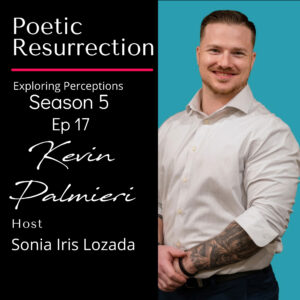 On this episode of the Poetic Resurrection Podcast, we have Kevin Palmieri as our guest. Kevin offers his wisdom about personal growth and maturation. We talked about the variations between having low and high self-regard and trust in oneself, and how those variables impact our goals and ambitions. Tune in to gain valuable knowledge about what it means to be alive.
On this episode of the Poetic Resurrection Podcast, we have Kevin Palmieri as our guest. Kevin offers his wisdom about personal growth and maturation. We talked about the variations between having low and high self-regard and trust in oneself, and how those variables impact our goals and ambitions. Tune in to gain valuable knowledge about what it means to be alive.
Kevin Palmieri is CFO, Founder & Co-Host of Next Level University, a Global Top 100 Self-Improvement Podcast with more than 1,350 episodes and 800K+ listens in over 125 countries.
In Kevin’s own words:
Some people find rock bottom… I found out that rock bottom had a basement.
In my mid 20’s… I had it all. I had a beautiful girlfriend, high paying job, sports car, my dream body… but I still ended up sitting on the edge of a bed debating suicide. After my rock bottom moment, I went all in on holistic self-improvement. I was determined to overcome my anxiety, depression and to finally live the life I’d always dreamed of.
Years later, I now host a podcast that impacts hundreds of thousands of people in countries all over the world. At this stage, I’ve helped grow the podcast into a multi six-figure business, and I’ve recorded well over 1,300 episodes. I’ve also given hundreds of speeches, trainings and coaching calls with people all over the world.
The main thing that changed was ME. I focused on learning what I didn’t know (unlearning a lot too), and my life started to shift. I love talking about Consistency, Commitment, Habits, Mindset, Confidence, Fear, Relationships, Limiting Beliefs and everything in between. I believe in a heart-driven but NO BS approach to holistic self-improvement, and I look forward to teaching even more people about what it really takes to get to the next level!
Listen to Kevin Palmieri’s episode

